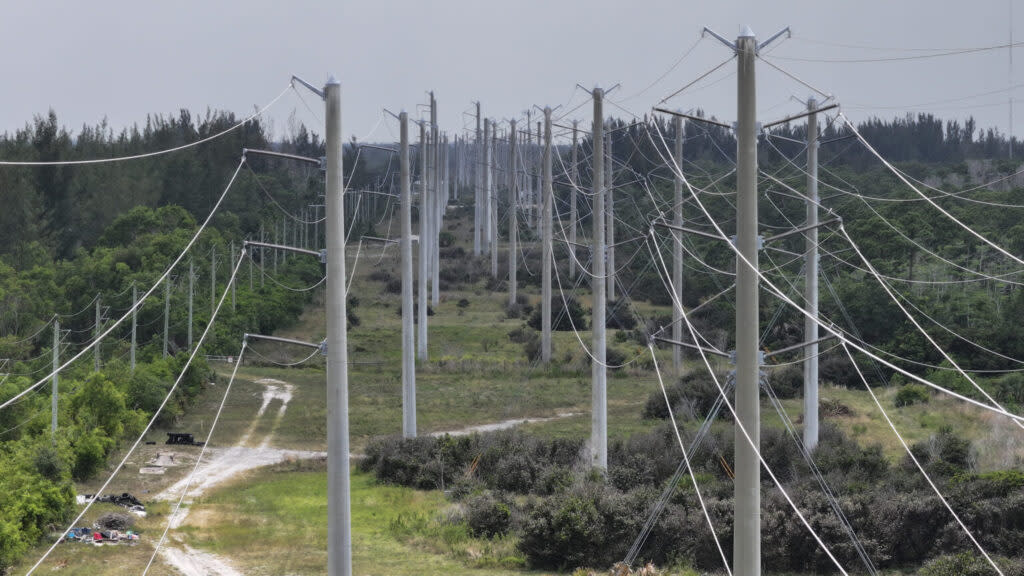Industry, clean power groups breath a sigh of relief as Senate approves energy regulators

WEST PALM BEACH, FLORIDA - MAY 16: In an aerial view, high voltage power lines run along the electrical power grid on May 16, 2024, in West Palm Beach, Florida. The grid is strained by increasing demand from electricity-hungry data centers and electric vehicles, disruptions due to severe weather events, and more. The Federal Energy Regulatory Commission recently issued a sweeping reform to transmission grid planning in an effort to improve the nation's aging power grid. (Photo by Joe Raedle/Getty Images)
Three nominees by President Joe Biden to serve on the nation’s top energy regulatory panel, which had risked losing a quorum, were approved this week by the U.S. Senate.
The vote to approve the new members — two Democrats and a Republican — for the Federal Energy Regulatory Commission was cheered by industry, renewable power and environmental groups alike, who said a full a complement of commissioners is essential to the body meeting the challenges posed by an aging electric grid, a fast-shifting generation mix and debates over natural gas infrastructure, among other pressing energy issues.
“We are pleased to see FERC will be restored to a full roster, which will help provide regulatory certainty and the attention needed on key questions impacting our nation’s energy systems,” said Todd Snitchler, president and CEO of the Electric Power Supply Association, or EPSA, which represents companies that own power plants in competitive electricity markets.
“Having a full complement of five commissioners will allow FERC to keep advancing the vital work needed to deliver reliable, affordable and clean power to everyone around the country,” said Ted Kelly, director of clean energy at the nonprofit Environmental Defense Fund.
FERC, which regulates interstate transmission and wholesale sales of electricity, as well as interstate transmission of natural gas and oil, among other responsibilities, “rarely shows up on people’s radar screens,” said Senate Majority Leader Chuck Schumer, D-N.Y. “But its mission is essential. Every time you turn on the light or touch the thermostat or see new power lines go up, the rules, regulations (and) policies of FERC are at work.”
Leaving the seats vacants, Schumer said, “could create serious backlog and delay, potentially slowing down new projects that power people’s homes and cites.”
The new commissioners are: David Rosner, a Democrat and FERC energy industry analyst; West Virginia Solicitor General Lindsay See, a Republican who led the state’s successful legal fight against the Environmental Protection Agency’s carbon rules; and Judy Chang, a Democrat, energy economist and the former undersecretary of energy and climate solutions for the Commonwealth of Massachusetts. She is also an adjunct lecturer and senior fellow at Harvard’s Kennedy School.
They join Chairman Willie Phillps, a Democrat, and Commissioner Mark Christie, a Republican. Commissioner Allison Clements, a Democrat, announced earlier this year she would not seek a second term. By law, FERC has five members, with no more than three from the same political party. They are appointed by the president with the “advice and consent of the Senate” and serve five-year staggered terms.
Though the commission will maintain a 3-2 Democratic majority, at least one environmental group has been critical of Rosner’s selection.
Friends of the Earth called Rosner’s fossil fuel ties “disqualifying” and blasted his work with the Senate Energy and Natural Resources Committee, headed by the powerful and pro-coal Sen. Joe Manchin, of West Virginia who in May switched his registration from Democrat to independent. Manchin recommended Rosner, who was also previously a senior policy advisor at the U.S. Department of Energy and an associate director at the Bipartisan Policy Center’s energy project, for the commission seat last year, Politico’s E&E News reported.
The Koch Industries-linked American Energy Alliance has also criticized Chang’s past opposition to new natural gas pipelines. But for the Senate, at least, the relatively smooth confirmation process appeared to show that having a full complement of commissioners was preferable to picking fights over individual nominees.
“We all know that having a fully staffed FERC is going to make a lot of difference in what we do in this country,” Manchin told his colleagues Tuesday, adding that each of the nominees had cleared his committee with “extremely strong” bipartisan support.
“Each of the nominees demonstrated deep experience on energy and legal matters, a commitment to follow the law and work within the authorities Congress has provided to FERC and a recognition that all of our nations’ sources play an important role providing affordable, reliable energy to families and businesses across our country.”
Sen. John Barrasso, a Republican from Wyoming and the ranking member on the Energy and Natural Resources Committee, noted that FERC went for seven months without a quorum during the Obama administration, putting many projects “that help keep the lights on, help heat our homes and aid our allies abroad” on hold.
“While I may not agree with each of the nominees on all the items all the time, all of them are well qualified,” he said.
The post Industry, clean power groups breath a sigh of relief as Senate approves energy regulators appeared first on Iowa Capital Dispatch.

